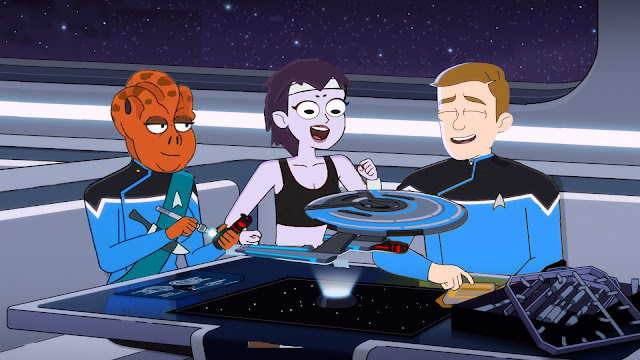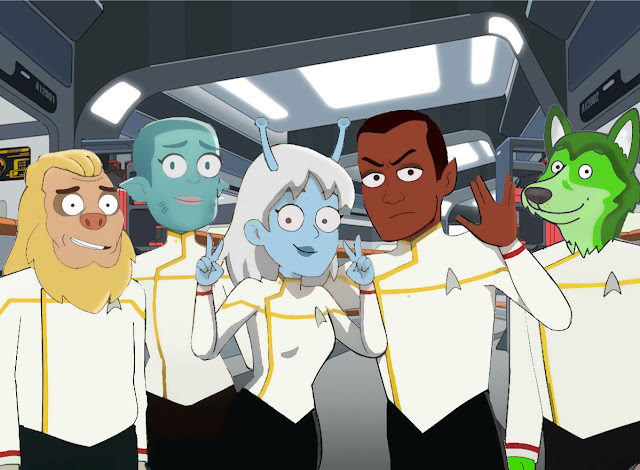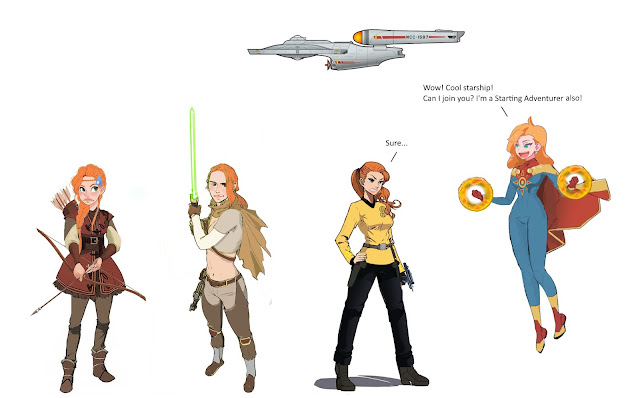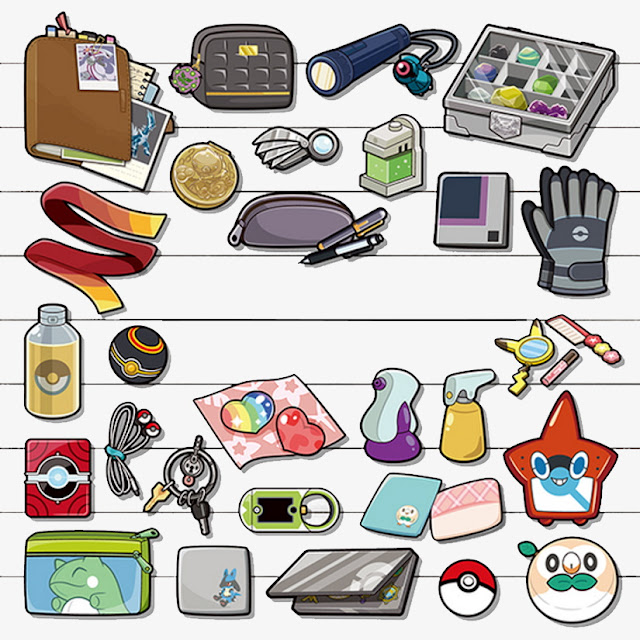I had a fascinating conversation with my friend Ray last week regarding Player Characters in Fantasy RPGs versus those in other games.
The focus of the discussion followed Ray's observations as to why I - me personally - often find it difficult to create Fantasy PCs and why I don't often find the Fantasy Player Characters I generate all that interesting. This can lead to my becoming bored with the character, wanting to try some other sort of Race/Class combo, or simply losing interest in the game overall.
Ray's keen insight into why I don't have an investment in Fantasy RPG characters is that they simply aren't particularly intriguing to begin with. They are not, by their nature, especially cool. To paraphrase Ray himself...
'Fantasy RPG characters don't start out interesting. They become interesting.'
I can just imagine the reactions to this statement out there in TRPG Internet Land and the images it conjures in my minds give me quite the hearty chuckle.
I should point out we are talking about Fantasy PCs created in the majority of the bigger, more popular Fantasy game systems; the discussion concentrates on RPGs like D&D, Pathfinder, Cypher System, and other Race/Class/Level based games. I could absolutely create a PC I find interesting in Ars Magica. Ars Magica is a very different beast from the games we're talking about here, though some of what makes it different will come into play (no pun intended) later in the post.
Many a modern gamer would disagree with this statement outright, saying the PC is as rich a character as the work you put into it. A truism I'll grant but that work is all you the player, with little coming from the system itself. Remember we are talking beginning PCs starting at 1st level here. I know many like to run and create characters that begin at 3rd Level or even higher but that only proves my point. The bulk of the classic style Fantasy games don't have you start at First Level with the kind of character you'd really like to play. That comes later (this is a key point that will come up further on in the post).
I can see the Grognards and Neckbeard Old-Schoolers (the latter the name of a Dwarf I met once I'm sure of it) saying that's the point! You start with nothing, a nobody, you're not a 'Character' in a story but a game piece, a component for the game that is D&D (or Rolemaster, Tunnels & Trolls, etc.). That's possibly true...and doesn't interest me. I don't want to play a glorified wargame or innovative board game. I want to go on adventures that tells/turns into stories and I want to be part of those stories with a story of my own.
Now back to Ray's proclamation: It's always kind of bugged me that you begin many Fantasy game with a character who often seems like they never existed before they first stepped foot in 'Ye Ole' Meeting Place' tavern or the Dungeon-of-the-Week.
"Flakgore the Barbarian turns to see an Elf in the Wizard Robes standing next to him. She wasn't there a moment ago but then again...was he? He has no memories of his life before opening the vaulted doors of the Crypt of Cataclysm. Looking at the other members of his party, there is a vague recollection of meeting them all in a tavern..."
These types of characters rarely feel 'real' to me and as such, I usually concoct a short description of who they are and why they've deciding upon the life of an adventurer. Without that, it all feels immaterial to me. Unimportant and definitely not special. The problem is, in my experience, I can't come up with a description because there isn't much to go on inspiration wise. Fantasy game settings often feel same-y to me and since I'm not a fan of the genre overall, these elements combine to create a blandness that doesn't motivate me to come up with much.
Then there's the make-up of the characters themselves...We begin with 'Race'. Humans are boring, the other Races sound cool on paper but have few mechanics reflecting the fluff, and there are rarely rules for creating your own Species. This has improved in later editions and various systems. Classes are fairly rigid, start with few abilities, and multi-classing is usually poorly thought out. There is little to give any ideas for character background (later editions of D&D and other systems have added this and its much appreciated), and I just don't know where to go with it since I'm at a handicap with Fantasy to begin with.
Compare this to some of my favorite games from other genres:
Star Trek (various versions) and Traveller: Rolls and/or choices develop your PCs pre-playing history. Your 'starting' character isn't just starting out in life but moving onto the next big, bold chapter of it - it just happens to be the chapter the GM and other players are interacting with.
Characters begin the campaign after their 'Pre-Academy' days and 'Tours of Duty'. They may have gained 'Special Assignments', received 'Promotions' and/or 'Commendations'. They've lived interesting fictional lives before they've even entered the first session. This person is, to me, instantly interesting. It inspires ideas and makes me want to answer questions like, 'What was their homeworld like?', 'What was the Special Assignment they were given?', and 'Who gave them their Commendation? Are they still in touch?'.
Star Wars (specifically the West End Games D6 System) is so customizable that you can practically make up a cool character first, then figure out the Template's numbers, skills, Species abilities, etc. Let's say...OK let me try an experiment. I am going to do a Google Image Search for 'Star Wars Alien'. Give me a moment.
OK, the first three were a Hutt, Grogu (Yoda's Species), and Jar Jar Binks, a Gungan. OK, I love redeeming the Gungans so I'll make one of those. What Template? I'll build my own. There is no official Gungan Mercenary but I like the idea of playing one. Another quick search shows a few different Gungan Species write-ups. The Second Edition has a Mercenary Template as well as rules for making Templates so - bing, bang, boom - I can make a Gungan Mercenary, customize some of the skills, take away some gear since I get a few Amphibious abilities as a Gungan and I have a character I like that I designed myself for the most part. His name is, hmm, Junji Terble. Yeah. I could totally play this guy.
I had 20 minutes and too much coffee so I made an image.
Champions and Ars Magica take the previous approach and lean in on it hard. Through the purchasing of Attributes, choosing Advantages and Disadvantages, building your various Powers and Abilities exactly the way you want, I can create precisely the character I would find interesting. I can come up with a story for the character and then dig through the systems for rules that reflect that story. If my Superhero character's origin has her trapped in a forest fire before being given her plant powers by Flora - Spirit of All Plants, Daughter of Mother Nature - she might be as mighty as a Redwood but remain afraid of fire. So...hmm...Psychological Limitation. Cool. How about...Pyrophobia and maybe she takes Vulnerability: Extra Damage from Fire. Nice. That gives me more points so I can add more Plant-themed gimmicks to my PC's repertoire. Which gimmicks? How do they work? The ones I want and how I want them.
One of my oldest Superhero characters, Excelsior - art by Keith Conroy, 1992.
The randomly generated Villains and Vigilantes version was cool.
The custom built Champions version was AWESOME!
It would seem that the main focus of classic Fantasy RPG Character Creation is more Character 'Generation'. You are, for the most part, along for the ride as you roll dice and make some choices. You are a passenger on a commercial airplane flight. You get to pick your meal from one or two choices, decide what you want to drink, and whether or not you want the peanuts.
With many of the games I enjoy it's more like being the pilot of a private jet. It's your plane. Go where you want to go, bring the food you want to eat, and if you want the peanuts, hell, knock yourself out.
As Ray notes (paraphrasing):
"The Fantasy character traditionally starts off simple. A basic design without much to make them appear unique. As they adventure, as they explore, fight monsters, and perform their skills, they will gather experience points they can spend to get new and more special abilities. Even more so, they will establish friends, enemies, and live through events that will give them a 'life story'.
Eventually, the PC will become much more interesting, both mechanically and narratively, as they've gone through numerous 'character building' moments."
OK, I get that. That certainly makes sense. I'll even go as far as to say it sounds fun to follow this complete rookie, this noob, through their development into a hero of the realm. But...
Spoiled as I may be, what with having cool traits, knacks, and maybe some neat equipment at the very start - all of which I built or decided upon myself - can you see how I'd automatically be more invested, more attached to this kind of character than the one just described?
At the end of say a dozen sessions, both a classic Fantasy RPG PC and a Space Adventure/Supers RPG PC will have had the same amount of potential in-game character building and development time.
Yet the Space Adventure/Supers character had a head start on the 'being cool' factor right from the get-go. This is key to my forming a relationship with the PC that makes me want to keep playing them.
What can be done...?
AD
Barking Alien
























